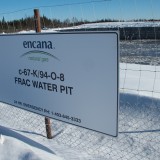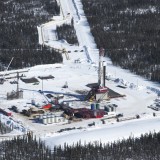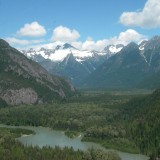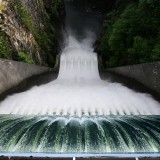Read this story from the Vancouver Sun on BC Hydro’s inability to accurately plan for future energy demands given the enormous potential requirements of proposed Liquefied Natural Gas projects on BC’s coast. (Nov. 19, 2012)
BC Hydro is getting an extension on its mega-plan for new electricity development so it can calculate how a new liquefied natural gas export industry would impact British Columbia’s power resources.
Energy Minister Rich Coleman said Friday that the deadline for Hydro’s Integrated Resource Plan or IRP, which was scheduled to be submitted to his office by next month, has been extended to August 2013 – three months after the next provincial election.
It’s the second delay – the original deadline was December 2011 – and it shows the challenges Hydro faces in developing a long-term electricity outlook amid rapid changes in the North American and global energy sectors.
The IRP is supposed to be a 20-year outlook on B.C.’s electricity needs, and Hydro has been working on it for several years. But just as Hydro released a draft version for public discussion, opportunities for LNG exports began to boom in Asia – particularly after the Fukushima nuclear disaster convinced Japanese regulators to look at other energy sources for electricity generation.
B.C., with vast, untapped natural gas reserves and proximity to Asia, is considered a secure potential supplier to that market.
Many of the world’s largest energy companies have indicated an interest in exporting LNG from B.C., and a half-dozen plants have already been proposed for Kitimat and Prince Rupert.
However, the industry requires substantial amounts of energy to process and compress gas for export – equivalent to at least 20 per cent of B.C.’s present electricity consumption. That demand spike is not factored into Hydro’s draft IRP.
As a result, the IRP was more or less out of date from the day it was released this summer.
Read more: http://www.vancouversun.com/business/prospects+delay+Hydro+mega+plan/7494384/story.html
B.C., with vast, untapped natural gas reserves and proximity to Asia, is considered a secure potential supplier to that market.
Many of the world’s largest energy companies have indicated an interest in exporting LNG from B.C., and a half-dozen plants have already been proposed for Kitimat and Prince Rupert.
However, the industry requires substantial amounts of energy to process and compress gas for export – equivalent to at least 20 per cent of B.C.’s present electricity consumption. That demand spike is not factored into Hydro’s draft IRP.
BC Hydro is getting an extension on its mega-plan for new electricity development so it can calculate how a new liquefied natural gas export industry would impact British Columbia’s power resources.
Energy Minister Rich Coleman said Friday that the deadline for Hydro’s Integrated Resource Plan or IRP, which was scheduled to be submitted to his office by next month, has been extended to August 2013 – three months after the next provincial election.
It’s the second delay – the original deadline was December 2011 – and it shows the challenges Hydro faces in developing a long-term electricity outlook amid rapid changes in the North American and global energy sectors.
The IRP is supposed to be a 20-year outlook on B.C.’s electricity needs, and Hydro has been working on it for several years. But just as Hydro released a draft version for public discussion, opportunities for LNG exports began to boom in Asia – particularly after the Fukushima nuclear disaster convinced Japanese regulators to look at other energy sources for electricity generation.
B.C., with vast, untapped natural gas reserves and proximity to Asia, is considered a secure potential supplier to that market.
Many of the world’s largest energy companies have indicated an interest in exporting LNG from B.C., and a half-dozen plants have already been proposed for Kitimat and Prince Rupert.
However, the industry requires substantial amounts of energy to process and compress gas for export – equivalent to at least 20 per cent of B.C.’s present electricity consumption. That demand spike is not factored into Hydro’s draft IRP.
As a result, the IRP was more or less out of date from the day it was released this summer.
Coleman said in an interview that the IRP deadline extension is intended to address that problem. He said the government is already engaging in negotiations with LNG project developers.
Those developers – according to Clean Energy B.C., a group representing the province’s independent power producers – are concerned that Hydro cannot in a timely fashion build the generating capacity and transmission infrastructure to meet their needs.
“I am very confident that it’s a valid industry, and if we get our fundamentals right, this is going to change our economy for generations to come,” Coleman said. “That’s why it’s such an important focus right now.”
Coleman said the government would amend its Clean Energy Act in spring 2013 to extend Hydro’s delivery date for the IRP. In the meantime, negotiations with companies such as Petronas, Shell, BG and Apache continue.
The Shell project alone represents a $12-billion investment. “The result of those negotiations are going to obviously help shape that 20-year electricity plan. It was really clear that we needed to make sure we had that piece nailed down as we entered into the IRP process. So that’s why I’m going to extend it,” Coleman said.
NDP energy critic John Hor-gan noted that the deadline extension means the public won’t see Hydro’s amended IRP until after next May’s provincial election.
“Clearly they are delaying this until after the election,” Horgan said. “The downside of that is that it exposes the absence of any coherent plan. The upside is that they won’t do any more damage until after the election.”
Horgan said the B.C. Liberals are in disarray on the topic of natural gas, with Premier Christy Clark proclaiming it a major potential source of revenue and jobs while Finance Minister Mike de Jong is blaming declining gas prices and demand for a significant drop in provincial revenue.
BC Hydro is getting an extension on its mega-plan for new electricity development so it can calculate how a new liquefied natural gas export industry would impact British Columbia’s power resources.
Energy Minister Rich Coleman said Friday that the deadline for Hydro’s Integrated Resource Plan or IRP, which was scheduled to be submitted to his office by next month, has been extended to August 2013 – three months after the next provincial election.
It’s the second delay – the original deadline was December 2011 – and it shows the challenges Hydro faces in developing a long-term electricity outlook amid rapid changes in the North American and global energy sectors.
The IRP is supposed to be a 20-year outlook on B.C.’s electricity needs, and Hydro has been working on it for several years. But just as Hydro released a draft version for public discussion, opportunities for LNG exports began to boom in Asia – particularly after the Fukushima nuclear disaster convinced Japanese regulators to look at other energy sources for electricity generation.
B.C., with vast, untapped natural gas reserves and proximity to Asia, is considered a secure potential supplier to that market.
Many of the world’s largest energy companies have indicated an interest in exporting LNG from B.C., and a half-dozen plants have already been proposed for Kitimat and Prince Rupert.
However, the industry requires substantial amounts of energy to process and compress gas for export – equivalent to at least 20 per cent of B.C.’s present electricity consumption. That demand spike is not factored into Hydro’s draft IRP.
As a result, the IRP was more or less out of date from the day it was released this summer.
Coleman said in an interview that the IRP deadline extension is intended to address that problem. He said the government is already engaging in negotiations with LNG project developers.
Those developers – according to Clean Energy B.C., a group representing the province’s independent power producers – are concerned that Hydro cannot in a timely fashion build the generating capacity and transmission infrastructure to meet their needs.
“I am very confident that it’s a valid industry, and if we get our fundamentals right, this is going to change our economy for generations to come,” Coleman said. “That’s why it’s such an important focus right now.”
Coleman said the government would amend its Clean Energy Act in spring 2013 to extend Hydro’s delivery date for the IRP. In the meantime, negotiations with companies such as Petronas, Shell, BG and Apache continue.
The Shell project alone represents a $12-billion investment. “The result of those negotiations are going to obviously help shape that 20-year electricity plan. It was really clear that we needed to make sure we had that piece nailed down as we entered into the IRP process. So that’s why I’m going to extend it,” Coleman said.
NDP energy critic John Hor-gan noted that the deadline extension means the public won’t see Hydro’s amended IRP until after next May’s provincial election.
“Clearly they are delaying this until after the election,” Horgan said. “The downside of that is that it exposes the absence of any coherent plan. The upside is that they won’t do any more damage until after the election.”
Horgan said the B.C. Liberals are in disarray on the topic of natural gas, with Premier Christy Clark proclaiming it a major potential source of revenue and jobs while Finance Minister Mike de Jong is blaming declining gas prices and demand for a significant drop in provincial revenue.
BC Hydro is getting an extension on its mega-plan for new electricity development so it can calculate how a new liquefied natural gas export industry would impact British Columbia’s power resources.
Energy Minister Rich Coleman said Friday that the deadline for Hydro’s Integrated Resource Plan or IRP, which was scheduled to be submitted to his office by next month, has been extended to August 2013 – three months after the next provincial election.
It’s the second delay – the original deadline was December 2011 – and it shows the challenges Hydro faces in developing a long-term electricity outlook amid rapid changes in the North American and global energy sectors.
The IRP is supposed to be a 20-year outlook on B.C.’s electricity needs, and Hydro has been working on it for several years. But just as Hydro released a draft version for public discussion, opportunities for LNG exports began to boom in Asia – particularly after the Fukushima nuclear disaster convinced Japanese regulators to look at other energy sources for electricity generation.
B.C., with vast, untapped natural gas reserves and proximity to Asia, is considered a secure potential supplier to that market.
Many of the world’s largest energy companies have indicated an interest in exporting LNG from B.C., and a half-dozen plants have already been proposed for Kitimat and Prince Rupert.
However, the industry requires substantial amounts of energy to process and compress gas for export – equivalent to at least 20 per cent of B.C.’s present electricity consumption. That demand spike is not factored into Hydro’s draft IRP.
As a result, the IRP was more or less out of date from the day it was released this summer.
Coleman said in an interview that the IRP deadline extension is intended to address that problem. He said the government is already engaging in negotiations with LNG project developers.
Those developers – according to Clean Energy B.C., a group representing the province’s independent power producers – are concerned that Hydro cannot in a timely fashion build the generating capacity and transmission infrastructure to meet their needs.
“I am very confident that it’s a valid industry, and if we get our fundamentals right, this is going to change our economy for generations to come,” Coleman said. “That’s why it’s such an important focus right now.”
Coleman said the government would amend its Clean Energy Act in spring 2013 to extend Hydro’s delivery date for the IRP. In the meantime, negotiations with companies such as Petronas, Shell, BG and Apache continue.
The Shell project alone represents a $12-billion investment. “The result of those negotiations are going to obviously help shape that 20-year electricity plan. It was really clear that we needed to make sure we had that piece nailed down as we entered into the IRP process. So that’s why I’m going to extend it,” Coleman said.
NDP energy critic John Hor-gan noted that the deadline extension means the public won’t see Hydro’s amended IRP until after next May’s provincial election.
“Clearly they are delaying this until after the election,” Horgan said. “The downside of that is that it exposes the absence of any coherent plan. The upside is that they won’t do any more damage until after the election.”
Horgan said the B.C. Liberals are in disarray on the topic of natural gas, with Premier Christy Clark proclaiming it a major potential source of revenue and jobs while Finance Minister Mike de Jong is blaming declining gas prices and demand for a significant drop in provincial revenue.
BC Hydro is getting an extension on its mega-plan for new electricity development so it can calculate how a new liquefied natural gas export industry would impact British Columbia’s power resources.
Energy Minister Rich Coleman said Friday that the deadline for Hydro’s Integrated Resource Plan or IRP, which was scheduled to be submitted to his office by next month, has been extended to August 2013 – three months after the next provincial election.
It’s the second delay – the original deadline was December 2011 – and it shows the challenges Hydro faces in developing a long-term electricity outlook amid rapid changes in the North American and global energy sectors.
The IRP is supposed to be a 20-year outlook on B.C.’s electricity needs, and Hydro has been working on it for several years. But just as Hydro released a draft version for public discussion, opportunities for LNG exports began to boom in Asia – particularly after the Fukushima nuclear disaster convinced Japanese regulators to look at other energy sources for electricity generation.
B.C., with vast, untapped natural gas reserves and proximity to Asia, is considered a secure potential supplier to that market.
Many of the world’s largest energy companies have indicated an interest in exporting LNG from B.C., and a half-dozen plants have already been proposed for Kitimat and Prince Rupert.
However, the industry requires substantial amounts of energy to process and compress gas for export – equivalent to at least 20 per cent of B.C.’s present electricity consumption. That demand spike is not factored into Hydro’s draft IRP.
As a result, the IRP was more or less out of date from the day it was released this summer.
Coleman said in an interview that the IRP deadline extension is intended to address that problem. He said the government is already engaging in negotiations with LNG project developers.
Those developers – according to Clean Energy B.C., a group representing the province’s independent power producers – are concerned that Hydro cannot in a timely fashion build the generating capacity and transmission infrastructure to meet their needs.
“I am very confident that it’s a valid industry, and if we get our fundamentals right, this is going to change our economy for generations to come,” Coleman said. “That’s why it’s such an important focus right now.”
Coleman said the government would amend its Clean Energy Act in spring 2013 to extend Hydro’s delivery date for the IRP. In the meantime, negotiations with companies such as Petronas, Shell, BG and Apache continue.
The Shell project alone represents a $12-billion investment. “The result of those negotiations are going to obviously help shape that 20-year electricity plan. It was really clear that we needed to make sure we had that piece nailed down as we entered into the IRP process. So that’s why I’m going to extend it,” Coleman said.
NDP energy critic John Hor-gan noted that the deadline extension means the public won’t see Hydro’s amended IRP until after next May’s provincial election.
“Clearly they are delaying this until after the election,” Horgan said. “The downside of that is that it exposes the absence of any coherent plan. The upside is that they won’t do any more damage until after the election.”
Horgan said the B.C. Liberals are in disarray on the topic of natural gas, with Premier Christy Clark proclaiming it a major potential source of revenue and jobs while Finance Minister Mike de Jong is blaming declining gas prices and demand for a significant drop in provincial revenue.
BC Hydro is getting an extension on its mega-plan for new electricity development so it can calculate how a new liquefied natural gas export industry would impact British Columbia’s power resources.
Energy Minister Rich Coleman said Friday that the deadline for Hydro’s Integrated Resource Plan or IRP, which was scheduled to be submitted to his office by next month, has been extended to August 2013 – three months after the next provincial election.
It’s the second delay – the original deadline was December 2011 – and it shows the challenges Hydro faces in developing a long-term electricity outlook amid rapid changes in the North American and global energy sectors.
The IRP is supposed to be a 20-year outlook on B.C.’s electricity needs, and Hydro has been working on it for several years. But just as Hydro released a draft version for public discussion, opportunities for LNG exports began to boom in Asia – particularly after the Fukushima nuclear disaster convinced Japanese regulators to look at other energy sources for electricity generation.
B.C., with vast, untapped natural gas reserves and proximity to Asia, is considered a secure potential supplier to that market.
Many of the world’s largest energy companies have indicated an interest in exporting LNG from B.C., and a half-dozen plants have already been proposed for Kitimat and Prince Rupert.
However, the industry requires substantial amounts of energy to process and compress gas for export – equivalent to at least 20 per cent of B.C.’s present electricity consumption. That demand spike is not factored into Hydro’s draft IRP.
As a result, the IRP was more or less out of date from the day it was released this summer.
Coleman said in an interview that the IRP deadline extension is intended to address that problem. He said the government is already engaging in negotiations with LNG project developers.
Those developers – according to Clean Energy B.C., a group representing the province’s independent power producers – are concerned that Hydro cannot in a timely fashion build the generating capacity and transmission infrastructure to meet their needs.
“I am very confident that it’s a valid industry, and if we get our fundamentals right, this is going to change our economy for generations to come,” Coleman said. “That’s why it’s such an important focus right now.”
Coleman said the government would amend its Clean Energy Act in spring 2013 to extend Hydro’s delivery date for the IRP. In the meantime, negotiations with companies such as Petronas, Shell, BG and Apache continue.
The Shell project alone represents a $12-billion investment. “The result of those negotiations are going to obviously help shape that 20-year electricity plan. It was really clear that we needed to make sure we had that piece nailed down as we entered into the IRP process. So that’s why I’m going to extend it,” Coleman said.
NDP energy critic John Hor-gan noted that the deadline extension means the public won’t see Hydro’s amended IRP until after next May’s provincial election.
“Clearly they are delaying this until after the election,” Horgan said. “The downside of that is that it exposes the absence of any coherent plan. The upside is that they won’t do any more damage until after the election.”
Horgan said the B.C. Liberals are in disarray on the topic of natural gas, with Premier Christy Clark proclaiming it a major potential source of revenue and jobs while Finance Minister Mike de Jong is blaming declining gas prices and demand for a significant drop in provincial revenue.
BC Hydro is getting an extension on its mega-plan for new electricity development so it can calculate how a new liquefied natural gas export industry would impact British Columbia’s power resources.
Energy Minister Rich Coleman said Friday that the deadline for Hydro’s Integrated Resource Plan or IRP, which was scheduled to be submitted to his office by next month, has been extended to August 2013 – three months after the next provincial election.
It’s the second delay – the original deadline was December 2011 – and it shows the challenges Hydro faces in developing a long-term electricity outlook amid rapid changes in the North American and global energy sectors.
The IRP is supposed to be a 20-year outlook on B.C.’s electricity needs, and Hydro has been working on it for several years. But just as Hydro released a draft version for public discussion, opportunities for LNG exports began to boom in Asia – particularly after the Fukushima nuclear disaster convinced Japanese regulators to look at other energy sources for electricity generation.
B.C., with vast, untapped natural gas reserves and proximity to Asia, is considered a secure potential supplier to that market.
Many of the world’s largest energy companies have indicated an interest in exporting LNG from B.C., and a half-dozen plants have already been proposed for Kitimat and Prince Rupert.
However, the industry requires substantial amounts of energy to process and compress gas for export – equivalent to at least 20 per cent of B.C.’s present electricity consumption. That demand spike is not factored into Hydro’s draft IRP.
As a result, the IRP was more or less out of date from the day it was released this summer.
Coleman said in an interview that the IRP deadline extension is intended to address that problem. He said the government is already engaging in negotiations with LNG project developers.
Those developers – according to Clean Energy B.C., a group representing the province’s independent power producers – are concerned that Hydro cannot in a timely fashion build the generating capacity and transmission infrastructure to meet their needs.
“I am very confident that it’s a valid industry, and if we get our fundamentals right, this is going to change our economy for generations to come,” Coleman said. “That’s why it’s such an important focus right now.”
Coleman said the government would amend its Clean Energy Act in spring 2013 to extend Hydro’s delivery date for the IRP. In the meantime, negotiations with companies such as Petronas, Shell, BG and Apache continue.
The Shell project alone represents a $12-billion investment. “The result of those negotiations are going to obviously help shape that 20-year electricity plan. It was really clear that we needed to make sure we had that piece nailed down as we entered into the IRP process. So that’s why I’m going to extend it,” Coleman said.
NDP energy critic John Hor-gan noted that the deadline extension means the public won’t see Hydro’s amended IRP until after next May’s provincial election.
“Clearly they are delaying this until after the election,” Horgan said. “The downside of that is that it exposes the absence of any coherent plan. The upside is that they won’t do any more damage until after the election.”
Horgan said the B.C. Liberals are in disarray on the topic of natural gas, with Premier Christy Clark proclaiming it a major potential source of revenue and jobs while Finance Minister Mike de Jong is blaming declining gas prices and demand for a significant drop in provincial revenue.
BC Hydro is getting an extension on its mega-plan for new electricity development so it can calculate how a new liquefied natural gas export industry would impact British Columbia’s power resources.
Energy Minister Rich Coleman said Friday that the deadline for Hydro’s Integrated Resource Plan or IRP, which was scheduled to be submitted to his office by next month, has been extended to August 2013 – three months after the next provincial election.
It’s the second delay – the original deadline was December 2011 – and it shows the challenges Hydro faces in developing a long-term electricity outlook amid rapid changes in the North American and global energy sectors.
The IRP is supposed to be a 20-year outlook on B.C.’s electricity needs, and Hydro has been working on it for several years. But just as Hydro released a draft version for public discussion, opportunities for LNG exports began to boom in Asia – particularly after the Fukushima nuclear disaster convinced Japanese regulators to look at other energy sources for electricity generation.
B.C., with vast, untapped natural gas reserves and proximity to Asia, is considered a secure potential supplier to that market.
Many of the world’s largest energy companies have indicated an interest in exporting LNG from B.C., and a half-dozen plants have already been proposed for Kitimat and Prince Rupert.
However, the industry requires substantial amounts of energy to process and compress gas for export – equivalent to at least 20 per cent of B.C.’s present electricity consumption. That demand spike is not factored into Hydro’s draft IRP.
As a result, the IRP was more or less out of date from the day it was released this summer.
Coleman said in an interview that the IRP deadline extension is intended to address that problem. He said the government is already engaging in negotiations with LNG project developers.
Those developers – according to Clean Energy B.C., a group representing the province’s independent power producers – are concerned that Hydro cannot in a timely fashion build the generating capacity and transmission infrastructure to meet their needs.
“I am very confident that it’s a valid industry, and if we get our fundamentals right, this is going to change our economy for generations to come,” Coleman said. “That’s why it’s such an important focus right now.”
Coleman said the government would amend its Clean Energy Act in spring 2013 to extend Hydro’s delivery date for the IRP. In the meantime, negotiations with companies such as Petronas, Shell, BG and Apache continue.
The Shell project alone represents a $12-billion investment. “The result of those negotiations are going to obviously help shape that 20-year electricity plan. It was really clear that we needed to make sure we had that piece nailed down as we entered into the IRP process. So that’s why I’m going to extend it,” Coleman said.
NDP energy critic John Hor-gan noted that the deadline extension means the public won’t see Hydro’s amended IRP until after next May’s provincial election.
“Clearly they are delaying this until after the election,” Horgan said. “The downside of that is that it exposes the absence of any coherent plan. The upside is that they won’t do any more damage until after the election.”
Horgan said the B.C. Liberals are in disarray on the topic of natural gas, with Premier Christy Clark proclaiming it a major potential source of revenue and jobs while Finance Minister Mike de Jong is blaming declining gas prices and demand for a significant drop in provincial revenue.







